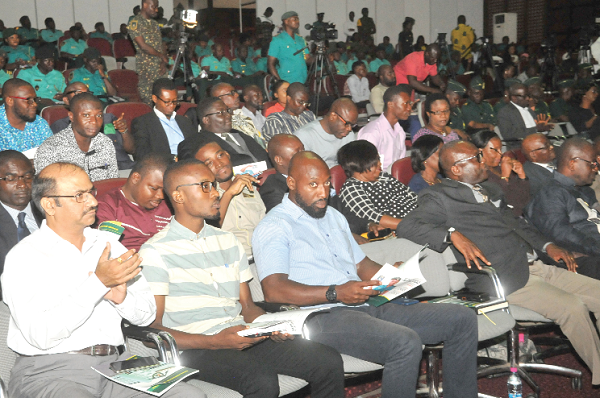
GIS launches 5-year strategic plan
The Ghana Immigration Service (GIS) has launched its second Five-Year Strategic Plan to respond to evolving migration trends.
The plan, which will serve as a blueprint for the development of the service over the next five years, identifies key challenges from the implementation of the previous plan and the changing dynamics within the GIS work environment.
Advertisement
Strategic plan
Launching the plan in Accra yesterday, the Chief of Staff, Ms Akosua Frema Osei-Opare, said it was timed to meet the changing migration trends that had engulfed the continent.
She said the plan, which outlines the vision, mission and strategic objectives of the service, as well as the activities to embark upon to realise the vision over the next five years, was very comprehensive and would build and strengthen the institutional capacity of the personnel.
Ms Osei-Opare said the plan also proposed interventions that would position the GIS to deliver effectively on its mandate of migration management.
International migration
In a speech read on his behalf, the Minister of the Interior, Mr Ambrose Dery, said migration was increasingly recognised as a major human development issue which, if effectively managed and harnessed, could contribute to the socio-economic transformation of the country.
He said there were far more international migrants in the world today than ever previously recorded and their numbers had increased rapidly in the last few decades.
Giving a break down, Mr Dery said the 2018 Annual Report of the International Organisation for Migration (IOM) pointed to a global increase in the size of international migration population from 153 million (or 2.9 per cent of the world population) to 244 million (or 3.3 per cent of the world population).

Ms Akosua Frema Osei-Opare (inset), the Chief of Staff, launching the five-year strategic plan
At the country level, he said, there were 417,642 international migrants in Ghana as of 2017, an increase of nearly one-quarter (23.9 per cent) from the 337,017 recorded in 2010, while between 2010 and 2017, the number of Ghanaians living outside the country increased by 15.5 per cent (694,009 to 857,603), the highest estimated reported since 1990 and equivalent to about three per cent of the country’s estimated population.
Mr Dery said to tap into the benefits of safe migration, it was expedient that every country managed its migration in an effective and efficient manner.
Recall
He recalled that historically, Ghana played host to many non-nationals, mainly from other African countries, to facilitate their development efforts during the early post-colonial era.
“The trend continued as Ghana, in addition to the promotion of Pan-Africanism, enjoyed relative economic prosperity soon after independence,” he said.
Mr Dery said over the years, immigrants into the country, particularly those from West Africa, easily merged with the nationals and joined the internal mobility of workers.
Therefore, he said, the nation could not sit aloof, with no proactive measures to ensure orderly and safe migration that would be of benefit to the country of origin and the country of destination.
Strategic plan
Accordingly, the minister said, in 2016, Ghana came out with a comprehensive national migration policy to help manage its internal, intra-regional and international migration flows for sustained national development.
He explained that the policy was also anchored within the 2006 African Union strategic framework for migration and the 2008 ECOWAS Common Approach on Migration, adding that its ultimate goal was to promote the benefits and minimise the cost of internal and international migration through legal means, with the rights and security of migrants well respected.
“Having perused this Strategic Plan of the GIS, it is reassuring to note that it has been developed to resonate with the national migration policy and other relevant national and international migration policies to ensure that the service is not working in isolation but in tandem or compliance with best practices,” he said.
Assurance
The minister congratulated the governing council, the Comptroller-General and his team on the development of the 2018-2022 Strategic Plan and assured them that the government, through the Ministry of the Interior, would make sure that the GIS delivered as was required.
For his part, the Comptroller General of the GIS, Mr Kwame Takyi, said the plan was expected to establish an ICT-driven immigration service that delivered excellence in migration management and national security through a motivated workforce.
He said there were six major components of the plan that adopted various strategies and activities to achieve the overall outcome of the goal.



